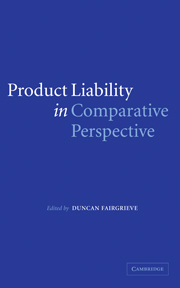Book contents
- Frontmatter
- Contents
- List of figures
- Foreword by Sir Michael Burton
- List of contributors
- Preface
- 1 Introduction
- PART I Country reports
- PART II European influences
- PART III Comparing systems
- 13 Harmonisation or divergence? A comparison of French and English product liability rules
- 14 Product liability law in Central Europe and the true impact of the Product Liability Directive
- 15 Bugs in Anglo-American products liability
- 16 Comparing product safety and liability law in Japan: from Minamata to mad cows – and Mitsubishi
- Appendix
- Index
13 - Harmonisation or divergence? A comparison of French and English product liability rules
from PART III - Comparing systems
Published online by Cambridge University Press: 28 July 2009
- Frontmatter
- Contents
- List of figures
- Foreword by Sir Michael Burton
- List of contributors
- Preface
- 1 Introduction
- PART I Country reports
- PART II European influences
- PART III Comparing systems
- 13 Harmonisation or divergence? A comparison of French and English product liability rules
- 14 Product liability law in Central Europe and the true impact of the Product Liability Directive
- 15 Bugs in Anglo-American products liability
- 16 Comparing product safety and liability law in Japan: from Minamata to mad cows – and Mitsubishi
- Appendix
- Index
Summary
On the 19 May 1998, ten years after the deadline for transposition, France finally enacted legislation incorporating the 1985 Product Liability Directive into national law. These provisions have been added to the Code Civil as articles 1386–1 to 1386–18. The aim of this chapter is to consider to what extent French and English product liability laws have been harmonised by the incorporation of the Directive, but it will restrict itself to examining one aspect of this question, namely whether incorporation has had the effect of harmonising the rules relating to the acts generating liability in the two systems.
The preamble to the Directive declares that harmonisation of national rules is necessary in view of the fact that disparities are liable to distort competition, to affect the free movement of goods and lead to differences in the level of protection offered to consumers against physical injury and damage to goods caused by a defective product. The Directive also aims to find ‘a fair apportionment of the risks inherent in modern technological production’. It is the difficulty in reconciling differences at national level in the conception of the apportionment of the risks between industry and the victim which led to the final version of the Directive being a compromise measure that includes a number of opportunities for divergence between national laws. Such differences in conception are clearly revealed in a comparison between French and English product liability laws.
- Type
- Chapter
- Information
- Product Liability in Comparative Perspective , pp. 221 - 243Publisher: Cambridge University PressPrint publication year: 2005
- 2
- Cited by



